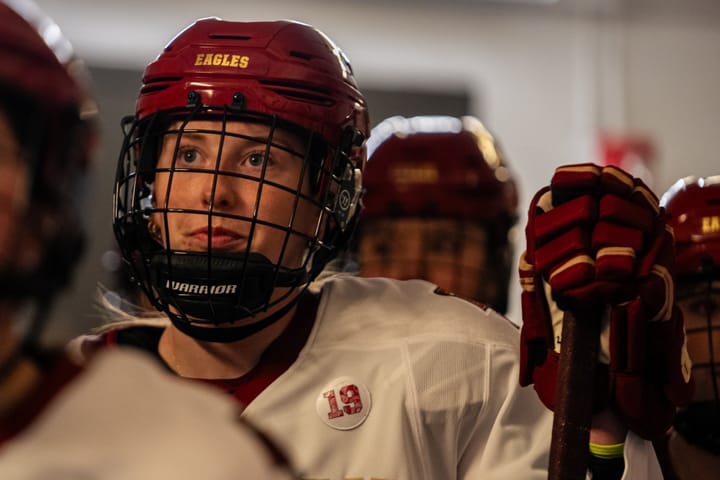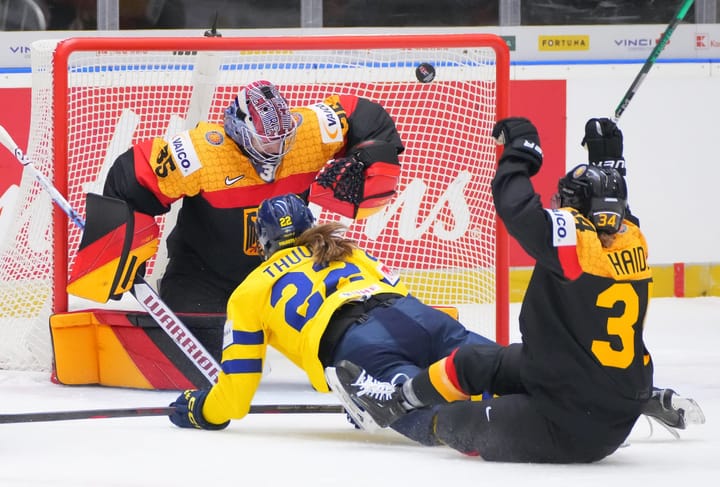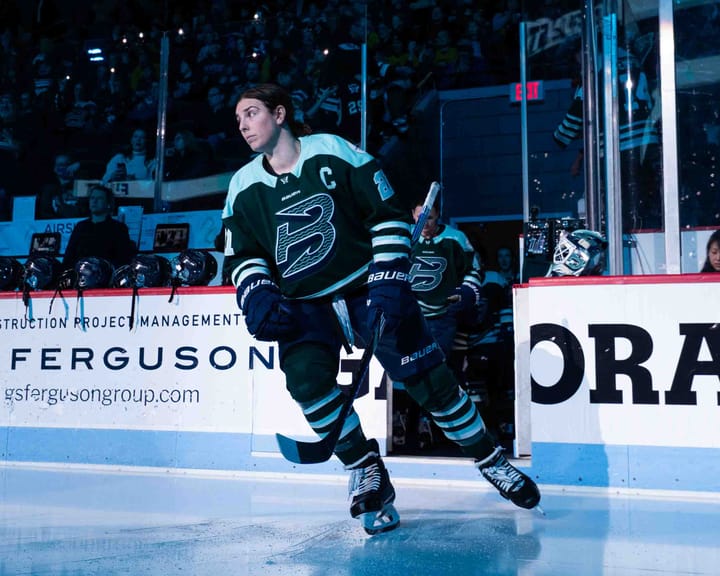The Lamoureux Twins are dedicated to leveling the playing field
The gold medal-winning twins discuss the Jocelyne and Monique Lamoureux Foundation and more
Jocelyne Lamoureux-Davidson and Monique Lamoureux-Morando have moved mountains together.
In 2017, the twins stood united with the rest of the United States women’s national team ready to boycott the 2017 Women’s World Championship in Michigan in order to negotiate for greater equity with USA Hockey. The national governing body agreed to pay the team more than it ever had before in addition to providing greater travel and medical benefits. The sisters and their teammates underlined that victory by taking to the ice and claiming gold in the tournament.
Related
Team USA boycott of IIHF Worlds about “more than hockey”
Last year, they reached the top of the mountain in the world of women’s hockey. Jocelyne scored the shootout winner in the gold medal game of the 2018 Olympics after Monique tied the game with less than seven minutes left in the third period. It was the U.S. team’s first Olympic gold in two decades.
Now, the Lamoureuxs are taking on a new challenge that hits close to home. Together, they’ve created the Jocelyne and Monique Lamoureux Foundation to support kids in need through the funding of educational and extracurricular programs in their home state of North Dakota.
On Thursday, the two caught up with The Ice Garden to discuss their foundation, motherhood, getting back on the ice, and much more.
The Ice Garden: When did you two first realize that you wanted to do something like the foundation?
Jocelyne Lamoureux-Davidson: After the Olympics we were very fortunate to have a plethora of opportunities to travel and speak. Some of the events we went to were very much centered around the Olympics and the gold medal, but we also became ambassadors for Comcast’s corporate values initiative — specifically, we traveled for their internet essentials program.
It really opened our eyes to making a difference in a lot of communities and schools that were under resourced. After traveling the country we felt like the best way we could make a difference in our own community was to give back to initiatives that are going to level the playing field, specifically for kids.
TIG: Have you taken any lessons from your experience negotiating for greater equity with USA Hockey helpful in this pursuit?
Monique Lamoureux-Morando: The Foundation has been a little bit easier, because it’s just Jocelyne and I. Ultimately, we make the decisions about where we donate money and how to make a difference.
We’re really trying to gauge where the need is, especially in Grand Forks. So, we’re meeting people that work with the foundation in the school district trying to figure out where the need is — whether that’s the free and reduced lunch program or [other areas of need].
There have been so many things we have learned from our battle for gender equity in hockey. I think those lessons have definitely transcended into trying to make a difference for any inequity that we may see — and not just gender equity, but also in the diversity and inclusion space and for kids who just don’t have the same opportunities and resources as others.
TIG: As new mothers, does helping to create a level playing field for kids carry any extra significance?
MLM: I was just talking about this earlier. Now that we have kids it gives us a whole new perspective about the issues that we are passionate about. You can’ possibly look at two kids and say, ‘You deserve this opportunity because you grew up on this side of town.’ How can you possibly look at kids and tell them that? But that’s the reality that a lot of kids grow up in.
If we’re able to provide resources to kids who may not have the same opportunities and really level the playing field by changing different aspects of their life, that might change their education and truly make a difference. That’s something that we really want to be a part of.
TIG: I noticed that North Dakota has a high percentage of girls and women registered with USA Hockey. What kind of value do you think team sports hold for children and how important is it to level the playing field and increase access for lower-income families to a sport like hockey?
JLD: Sports are a vehicle to teach life lessons to kids. It’s an opportunity for them to be active, which is important, and it teaches them about being healthy. It can be team sports or individual sports.
Even at a young age, in individual sports you learn all about accountability and work ethic and taking instruction from a coach. If it’s a team sport, you’re learning how to work within the team and within a group and work towards a common goal. Those are things that, as adults, you need those skills. We think sports is a fun way to learn those life lessons.
One program that we’re very proud to be associated with is the Ed Snider Hockey Foundation in Philadelphia. It’s the perfect example of what sports can mean to kids. We know that hockey is not the cheapest sport to play. The Snider Hockey Foundation provides the opportunity for kids to play hockey for free and the only stipulation is that they have to keep their grades up — and there are tutors at the rinks. I think that’s a perfect example of sports being so much more than sports.
Eventually, I think we might get into that space. But right now, with our foundation, we’re looking at what kids need at the most basic level, like funding the lunch program. At the most basic level we want kids to succeed in school and focus on their education. It’s pretty hard for them to focus when they’re hungry. That’s where we are starting.
TIG: I know that “mom strength” is a real thing. Can you speak to that? Has carrying around the little ones helped you develop some new muscles that might improve your slap shots?
MLM: Actually, Jocelyne and I were talking about this the other day! We are back training at full-go right now. I will definitely say that in the first few weeks my back was getting pretty sore from holding the baby, but in the last couple months it’s been good. I think our arm strength is up there.
When it comes to hockey, we just have a whole new motivation for why we want to get back and get back to being an elite athlete. We want to show athletes and all working moms that you can do both; you don’t have to choose between your career and being a mother. That’s why we like to share our story, because we feel that it transcends into any profession.
But I would say that ‘mom strength’ is definitely a thing.
TIG: Is it tricky to find time for all of your pursuits, or is it one of those things where you find a way to make time because these things are all so important to you?
JLD: Yeah, I make the time. I’m a player rep for the PWHPA and I’m a player rep for USA Hockey on top of doing the foundation, training, and mom’ing it up the best that I can — which is the most important job. You just figure out a way.
I’m the type of person that if I have a to-do list, I just focused on getting everything done in the first half of the day so that my evenings could be pretty low-key. Right now, things are pretty much in the reverse.
Monique and I have in-home daycare so we can drop our kids off and go skate, train, and get calls done. We pick them up in the afternoon and then we’re mom for all of the hours that we’re still awake. I finally sit down when I’m going to bed and can hopefully give my husband a half hour or an hour of my time before I’m shooting off emails. I’ve been on a lot of calls lately. Last week, I was on a call every night of the week and a lot of times on the weekend.
You just figure it out because these are things that we’re passionate about. They all take time. You just have to find a way to keep balance. Monique and I are very fortunate because we have husbands who are very supportive of us continuing our hockey careers, so there’s a great support system at home. We’re also fortunate because we’re in the positions that we are in and have the opportunity to make a difference.
Note: Portions of this interview have been edited for brevity and clarity.





Comments ()